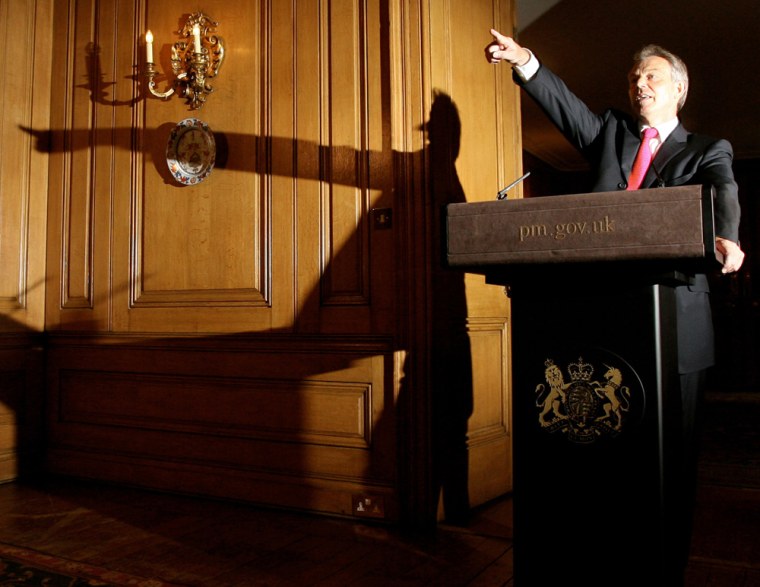Islamic militants and world governments warned Thursday that violence would continue in Iraq and around the globe despite the death of Abu Musab al-Zarqawi, who was killed by a U.S. airstrike.
British Prime Minister Tony Blair said al-Zarqawi’s death was a victory.
“The death of al-Zarqawi is a strike against al-Qaida in Iraq and, therefore, a strike against al-Qaida everywhere but we should have no illusions,” Blair said at his monthly news conference. “We know that they will continue to kill, we know that there are many, many obstacles to overcome.”
Britain, America’s main coalition partner, has about 8,000 troops in southern Iraq.
President Bush said the killing of al-Zarqawi was “an opportunity for Iraq’s new government to turn the tide of this struggle,” but he said more terrorist and insurgent violence is to be expected.
“We have tough days ahead of us in Iraq that will require the continued patience of the American people,” he said.
A former close aide to Osama bin Laden said Thursday that al-Zarqawi’s death would spark retaliatory attacks across Iraq.
Reprisal attacks expected
“Al-Zarqawi’s martyrdom is not going to weaken the jihad in Iraq,” Khalid Khawaja, a former Pakistani intelligence officer who helped bin Laden fight Soviet forces in Afghanistan, told The Associated Press.
“Rather, you will soon see more retaliatory attacks by his successors.”
Italian defense minister Arturo Parisi expressed “satisfaction for the action of the coalition, which certainly contributes in a very significant way to the fight against international terrorism.”
Italy’s 2,600 troops are expected to be withdrawn by year’s end.
Polish Prime Minister Kazimierz Marcinkiewicz said killing al-Zarqawi will “move the dynamics of the situation in Iraq in a good direction,” the PAP news agency reported.
“The less terrorists there are, especially at the highest level, the calmer the situation in Iraq will be,” he said.
Poland has some 900 troops in south-central Iraq, where it commands a multinational force.
The father of a U.S. contractor believed slain by al-Zarqawi said he did not see any good coming from the terror leader’s death.
Personally beheaded victims
Michael Berg, whose 26-year-old son, Nicholas, was taken hostage and beheaded on videotape in 2004, said al-Zarqawi’s death leaves the terror leader’s family in grief and likely will spark fresh violence.
“I see more death coming out of al-Zarqawi’s death,” said Berg, a pacifist running for Delaware’s lone U.S. House seat on the Green Party ticket.
Al-Zarqawi also is believed to have beheaded Eugene Armstrong, a 52-year-old contractor formerly from Hillsdale, Mich.
“An evil man is dead, and what more can you say?” said family spokeswoman Cyndi Armstrong, the wife of the slain man’s cousin.
Paul Bigley — the brother of Briton Kenneth Bigley, who was kidnapped Sept. 16, 2004, and beheaded — said he believed al-Zarqawi was behind his brother’s death.
“My initial thoughts are that the world has rid itself of a very evil person — if a person at all. He’s a specimen, that’s what he is,” Bigley told the AP. “I hope they catch the others ASAP.”
A minor bump in the road?
During a visit to Islamabad, Pakistan, Palestinian Foreign Minister Mahmoud Zahar said al-Zarqawi’s death was only a minor loss to the anti-U.S. resistance movement.
“We are dead sure that assassination of any of the people (like al-Zarqawi) who are resisting will not ... end the resistance,” said Zahar, a hard-line Hamas leader.
In Jakarta, Indonesia, a close aide of the militant cleric Abu Bakar Bashir, who is in prison for conspiracy in the deadly 2002 Bali bombings, said al-Zarqawi’s death would not affect the fight by Islamic militants.
“The arrest or death of Abu Musab al-Zarqawi does not mean the end of the struggle, because Islam does not depend on any personality,” Fauzan Al-Ansory said. “It does not depend on al-Zarqawi, on Osama or Abu Bakar Bashir. Even if it’s true, there will be many new Abu Musabs to be born.”
'Great news' for Iraqis
In Australia, which has 2,000 troops in Iraq, Prime Minister John Howard called al-Zarqawi’s death “great news” for Iraqis, “the real victims of his murderous behavior.”
“Not only does his death remove a cruel terrorist, but it’s also a huge boost for anti-terrorist forces in Iraq,” Howard said.
The government of South Korea, which is reducing its 3,200-member contingent in northern Iraq by 1,000 troops by year’s end, declined immediate comment.
Japanese Prime Minister Junichiro Koizumi called the action a “step forward,” and senior Vice Foreign Minister Katsutoshi Kaneda said he hoped the news would herald a new period of stability.
Afghanistan, which hosted bin Laden and his terror training camps before a U.S.-led invasion ousted the hard-line Taliban regime, praised the American attack.
“Al-Zarqawi’s death is a huge victory in the war” on terrorism, Defense Ministry spokesman Gen. Zahir Azimi said. “This is good news for all Muslims and people of all religions. He was killing people of all faiths.”
The Pakistani government said it hoped the Jordanian-born militant’s killing would blunt the violence ravaging Iraq.
“It is a significant development in the war on terrorism and Pakistan continues to hope that the security situation will, particularly now, improve,” Foreign Ministry spokeswoman Tasnim Aslam said.
Some Muslims in Somalia, where Islamic militant militiamen just seized control of the capital and surrounding areas, expressed sympathy for al-Zarqawi.
“His death is a bad news for all Muslims because he was facing a great, superpower enemy of Islam in the United States,” said Shamsa Abdi, a mother of six.
